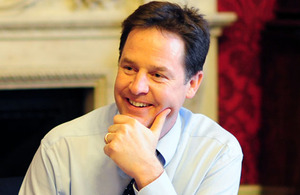Deputy Prime Minister announces extra £22 million for ground-breaking children’s mental health programme
Nick Clegg: "Too many young people suffer in silence with mental health problems."

Up to £22 million will be pumped into a pioneering programme to give children with mental health problems access to the best available services in a wider range of places, Deputy Prime Minister Nick Clegg announced today.
The new investment in the Children and Young People’s Improving Access to Psychological Therapies (IAPT) project will be spent over the next three years to expand state-of-the-art psychological therapies and extend training for people working with youngsters outside of health settings, such as in schools or youth groups.
One in ten children aged 5-16 years has a clinically diagnosable mental health problem and, of adults with long-term mental health problems, half will have experienced their first symptoms before the age of 14. Self-harming and substance abuse are known to be much more common in children and young people with mental health disorders - with ten per cent of 15-16 year olds having self-harmed.
Failure to treat mental health disorders in children can have a devastating impact on their future, resulting in reduced job and life expectations. Encouraging people to be open about mental illness and extending available therapies will help to ensure intervention is available at the earliest opportunity giving young people the best chances in life.
Deputy Prime Minister, Nick Clegg, said:
Too many young people suffer in silence with mental health problems. This is vital investment that will give children the very best tailored treatment to restore them to good health, so that their illnesses are not simply swept under the carpet.
With one in ten young people suffering from a mental health problem, we cannot let this issue drift or rely on adult services as a cure-all. The money we are investing today will work specifically for children on therapies that are proven to work.
Mental health must have the same priority as physical health. Giving children the treatment they need as soon as they need it will help ensure that millions of children suffering from a mental health problem will have a fairer opportunity to succeed in life.
Care Services Minister Paul Burstow said:
We broke new ground last year investing in children’s mental health - this additional funding will help deliver services specific to young people. We’re working with young people and staff to start to change the way mental health is delivered by the NHS.
Half of those with mental health problems first experience symptoms by the age of 14, and three quarters before their mid-20s. This pioneering work will focus on early and effective treatment.
We know psychological therapies work. Our aim is to transform existing mental health services for children so our children get the best treatment possible, from services that are more responsive to their needs.
The new funding will be spent on:
- making treatment available to many more young people with mental health problems
- providing access to a wider range of psychological therapies including help to support families, or treatment for major health problems of adolescence including eating disorders, depression, self-harm, and conduct problems occurring with Attention Deficit Hyperactivity Disorder (ADHD)
- training to focus on extending the skills and experience of NHS clinicians and people who work with young people such as teachers, social workers and counsellors
This additional investment comes on top of the £32 million announced last October, which saw the Government extend the IAPT programme to children and young people as set out in the Mental Health Strategy.
YoungMinds Chief Executive, Sarah Brennan, said:
We are delighted that the government has committed to further extending IAPT services for children and young people. Intervening early when a child or young person starts struggling to cope is proven to reduce the likelihood of that young person developing much more severe and entrenched mental health problems.
By 2030 the World Health Organisation predicts that more people will suffer with depression than any other health problem. It is vital that we invest in children and young people’s mental health in order to prevent a generation of children suffering entrenched mental health problems as adults.
Children and young people tell us they want to play a central role in making decisions about their care. Children and Young People’s IAPT is a shining example of putting the voice of children and young people at the heart of design and delivery of services. As the programme expands we hope this continues.
The Department of Health is also providing up to £16 million funding over the next four years to the longstanding Time To Change social marketing campaign to tackle mental health stigma and discrimination. In January, the Deputy Prime Minister and Care Services Minister attended a reception for Time To Change at which the organisation outlined their new workstream focusing purely on stigma and discrimination amongst children and young people. This is the first time a Government has funded such a campaign.
Sue Baker, Director of Time to Change said:
We know that mental illness is still a taboo subject, and this is very much the case with children and young people who tell us that they don’t feel able to talk to their friends, families or others if they are struggling.
As part of our new campaign to change the attitudes and behaviour of young people, we have a talented team of young people with mental health problems who will lead this work. By reducing stigma in this way we will see more young people access the services that the Government are increasing investment in, and our future generation able to be active citizens without the barriers of discrimination and misunderstanding.
Notes to Editors
- Up to £22 million over the next three years will be invested in the Children and Young People’s IAPT project.